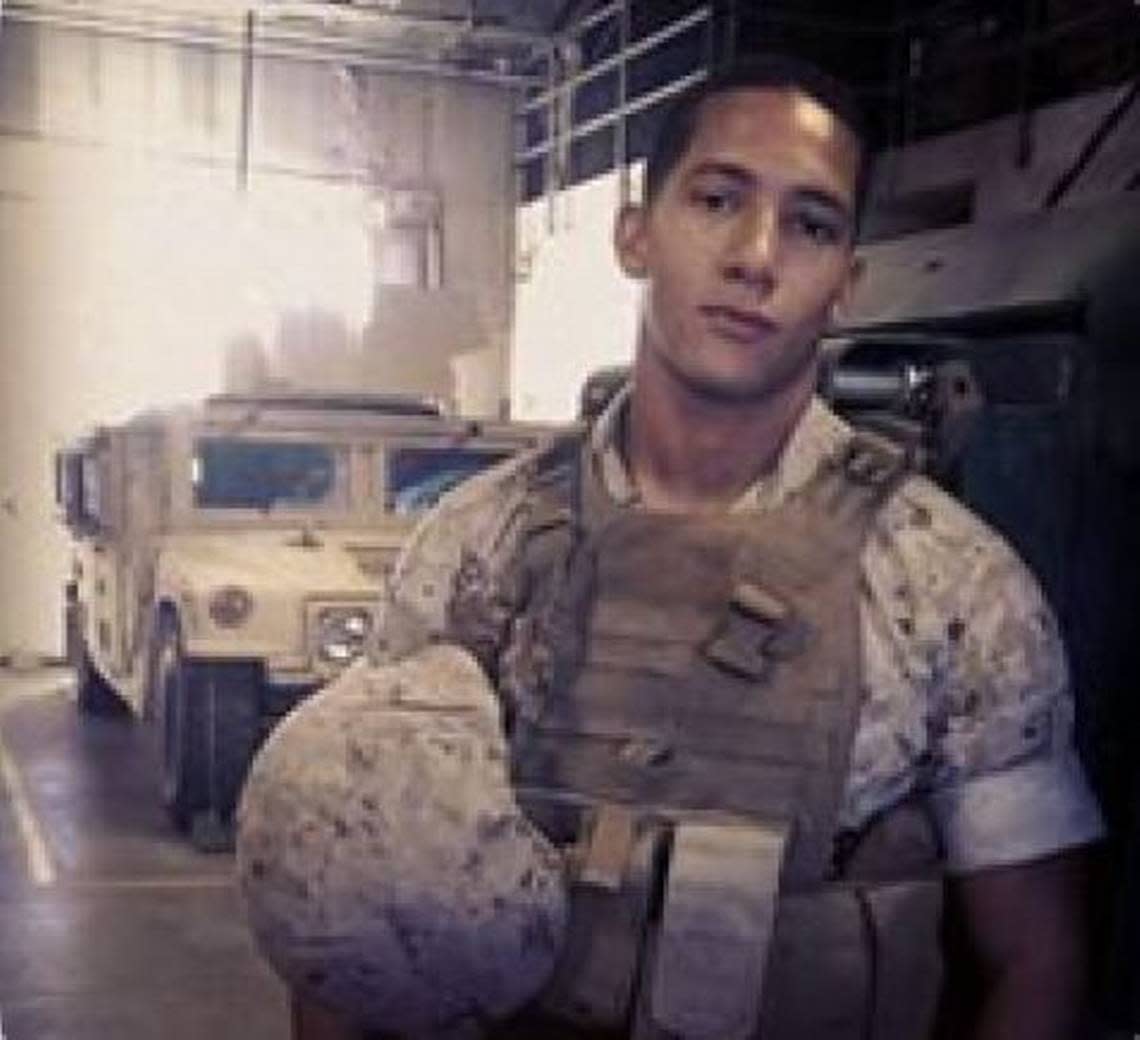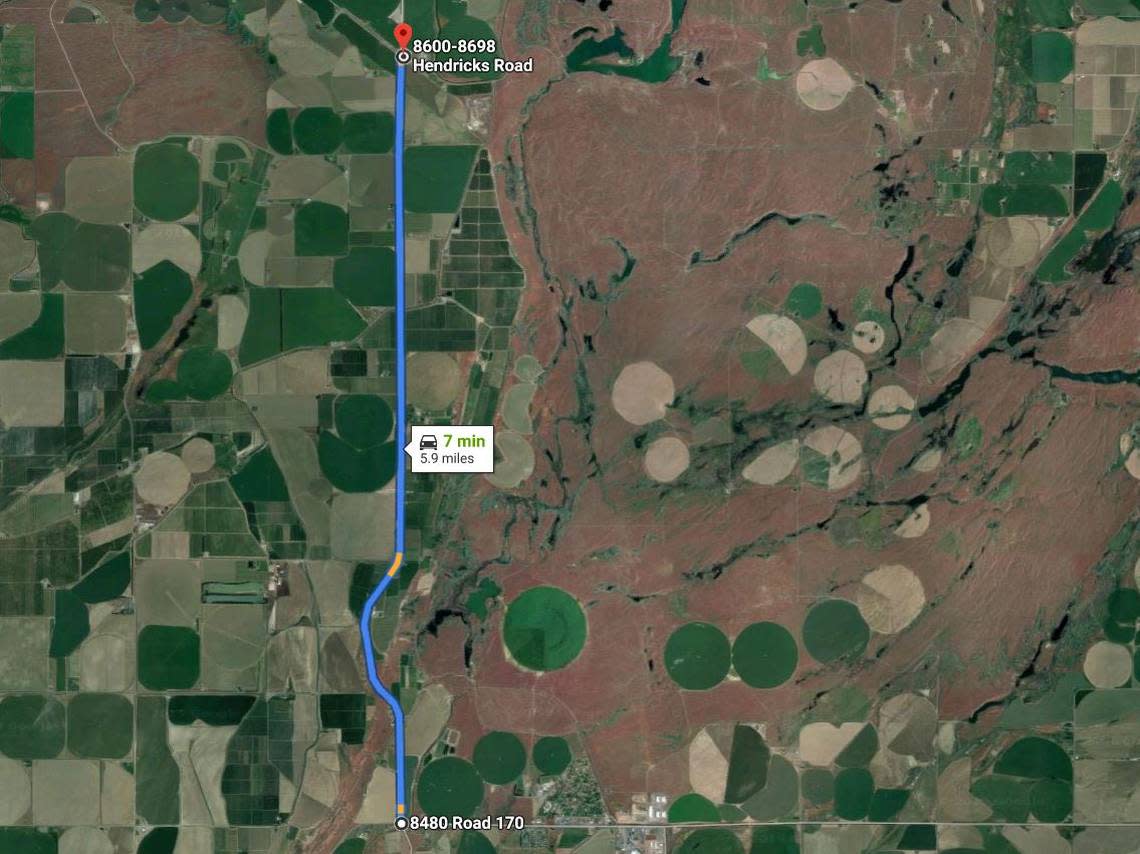Family of former U.S. Marine sues after a Franklin deputy shot and killed him
A Franklin County deputy’s poor choices led to the death of a former U.S. Marine on a icy rural road, according to a federal lawsuit.
Attorneys for Dante Jones’ father, Donald, painted a picture of a deputy with a history of endangering the public, combined with a lack of training and policies leading to the deadly November 2019 shooting.
Attorneys Brian G. Davis and Robert G. Schultz also claim the evidence does not fit with Deputy Cody Quantrell’s version of events, particularly whether he was inside or outside Jones’ car when he started shooting.

But Franklin County’s attorneys have denied those claims, down to if the weather that night made the roads hazardous.
The shooting death of Dante Jones happened before a 2021 state law pushed the Franklin County Sheriff’s Office to get body and dash cameras for deputies.
The lawsuit, filed in the U.S. District Court, comes more than a year after Prosecutor Shawn Sant called the shooting “especially tragic” but justified. The suit names the deputy, the sheriff and the county.
“Mr. Jones used his car as a deadly weapon when he attempted to drive off with Deputy Quantrell halfway inside the car. Deputy Quantrell was at risk of serious injury or death at the time he discharged his duty weapon,” Sant said in a news release at that time of his decision.
He told the Herald that the physical evidence matched Quantrell’s version of events. That included the deputy’s injuries.
Sant’s findings were based on a report by the Regional Special Investigations Unit. The team is called in to conduct independent investigations of officer-involved shootings but it’s up to the prosecutor whether an officer broke the law.
Sheriff Jim Raymond declined to comment on the lawsuit but confirmed that Quantrell is still employed by the sheriff’s office.
The lawsuit is the latest turn in a shooting that became one of the focal points for Tri-Cities Black Lives Matter protesters in 2020.
Former Marine
Jones grew up in Othello and spent time in the Tri-Cities after his mother left when he was 15, according to reports.
His deployments to Jordan and Syria as a U.S. Marine left him with post-traumatic stress disorder, said his family. He lived in Arizona with his father after coming home, but returned to the Tri-Cities eight months before he was killed.
Relatives and friends told SIU investigators that Jones was deeply affected by what he saw overseas, including the death of fellow soldiers and the bodies of children.
Veterans Affairs doctors were treating Jones, but the trauma left him with problems functioning in society, including trouble holding down a job at a hardware store or a restaurant, according to the SIU report.
A former roommate said Jones was ‘pro-cop’ and supportive of police. He was surprised to learn Jones had been killed in a confrontation with officers.
His only other trouble with police was a trespassing incident 10 years earlier involving a damaged fence in Pasco.
Friends told investigators that Jones had a drinking problem, and a former girlfriend said she believed he had used drugs before switching to alcohol.

Deputy’s history
Before the Quantrell joined Franklin County in 2018, he worked for the Toppenish Police Department in the Yakima Valley, where he was counseled for pulling out his sidearm when he stopped a motorcyclist, according to the lawsuit.
The motorcyclist was detained, searched and released after officers determined police didn’t have any reason to hold him, said the suit.
The attorneys quoted a portion of then Police Chief Curt Ruggles’ report, which said the tactic of advancing on a suspect with a gun drawn is something that should only be used in rare circumstances, such as helping another officer who is in immediate danger.
“What you did is considered ‘Tombstone Courage’ and that behavior has resulted in injuries and even death in police officers nationwide,” the chief said in his report.
The suit says Quantrell also was counseled for not stopping a police chase that ended up causing “significant damage” to his patrol vehicle and to a citizen’s fence.
The attorneys claim that Quantrell’s behavior didn’t improve when he joined the Franklin County Sheriff’s Office.
“Deputy Quantrell has been subject to numerous citizen complaints concerning his actions with the public,” said the suit. “As an example, during a routine traffic stop, Deputy Quantrell was found to use questionable verbal behavior and non-verbal actions which called into question his decision-making skills and professionalism.”
Between joining the sheriff’s office and the shooting, less than 1 percent of his training was dedicated to de-escalation techniques, the attorneys said.

Dante Jones’ death
The deadly confrontation began with a call about a suspicious vehicle on Fir Road. Quantrell, along with Sgt. Gordon Thomasson and Deputy Andrew Gardner, drove there to investigate.
While they were searching the area shortly after 3 a.m., a Honda Civic sped past Thomasson’s patrol SUV going 82 mph in a 55-mph zone on Taylor Flats Road.
The sergeant lost sight of the car before he could turn around, but he believed it could be the same car they were looking for, and he noted the driver honked as he was passing.
Thomasson spotted it again at a Taylor Flats Road intersection. As he got closer, the car sped off again.
He began following the car as it drove on Route 170, but hadn’t turned on his emergency lights yet.
Quantrell and Gardner took over following the car at 3:18 a.m. and they activated their emergency lights. Thomasson let them take over because their cars were better equipped to handle the slick roads. according to the suit.
While the county’s attorneys denied the weather was bad, the SIU investigation confirmed it was foggy.
As they followed, Jones would hit the brakes suddenly in an attempt to cause Quantrell to crash into him.
They continued to follow Jones, and while he slowed to highway speeds, the Civic didn’t stop.
Then at 3:22 a.m., Thomasson called off the chase because of the fog.
Jones’ attorneys pointed out that despite the order to end the pursuit Quantrell kept going.
Arrest attempt
At one point in the pursuit, Jones stopped the car, and then backed up until he stopped next to Quantrell’s driver’s side door.
Quantrell pulled his gun and stepped out, opening the Civic’s passenger door and ordering Jones, who was alone, to show his hands and told him he was under arrest.
Jones was looking at him, but said nothing, Quantrell told investigators. The deputy crawled into the car with the intention of grabbing the keys to shut off the engine.
He was halfway inside when Jones put the car into gear and started to drive, according to the SIU report.
When the car pulled forward Quantrell said he became pinned and feared he would be dragged under the car.
Before the deputy fell out of the car, he fired four of the 15 rounds in his pistol, said the report.
The badly wounded Jones drove a half mile before his car veered into an orchard off Sagehill Road. The deputies followed, and after putting him in handcuffs, tried to stop the bleeding by applying pressure and tourniquets, said the report.
Jones died on his way to the hospital.
Investigation questions
While the prosecutor said that Quantrell’s description of events matched the physical evidence from the scene as documented by the SIU team, Donald Jones’ attorneys argued there are inconsistencies.
They claim that the Washington State Patrol Crime Laboratory didn’t find that Quantrell fired the shots while he was inside the car.
“The evidence suggests that Deputy Quantrell shot Dante from a position outside of Dante’s vehicle in an attempt to stop Dante,” according to the complaint. “This was excessive under the circumstances and resulted in Dante’s death.”
